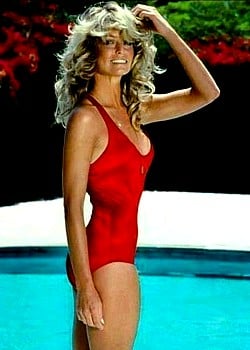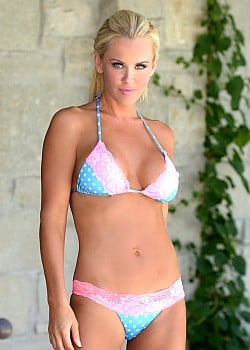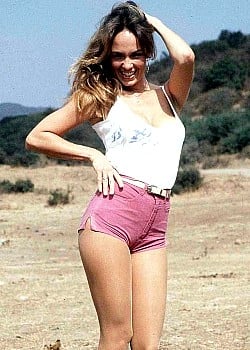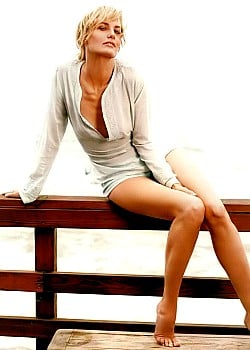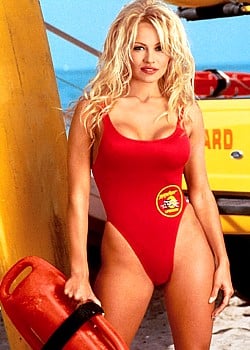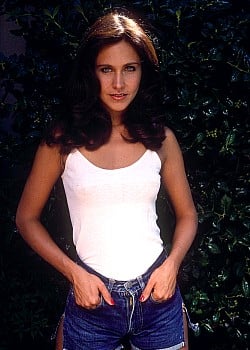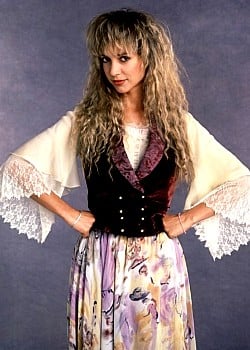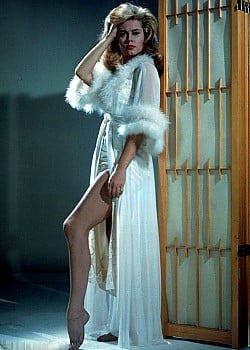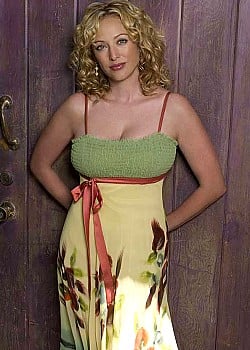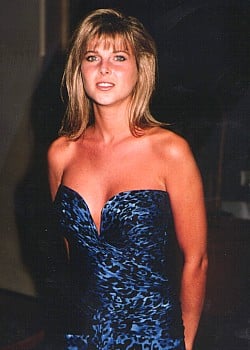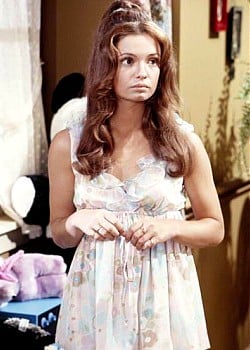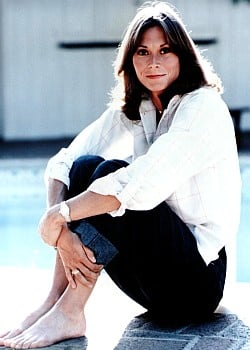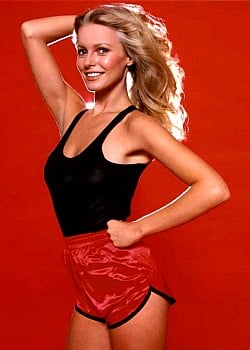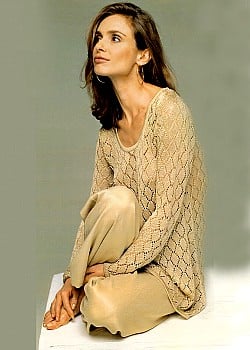About Farrah Fawcett
Farrah Fawcett (February 2, 1947 – June 25, 2009), known during the 1970s as Farrah Fawcett-Majors, was an American actress and artist. A multiple Golden Globe and Emmy Award nominee, Fawcett rose to international fame when she first appeared as private investigator Jill Munroe in the first season of the hit BC-TV television series Charlie's Angels, in 1976. Fawcett later appeared Off-Broadway to critical approval and in highly rated and critically acclaimed television movies, in roles often challenging such as the 1988 NBC-TV miniseries The Burning Bed and sometimes unsympathetic Small Sacrifices. Fawcett was a sex symbol whose iconic poster, released the same year Charlie's Angels premiered, broke sales records, making her an international pop culture icon. Her hairstyle was emulated by millions of young women in the 1970s and 1980s.
In the late 1960s and early 1970s, Fawcett appeared in television commercials for consumer products, starting with her selection as a Breck Girl for Breck Shampoo, and moving on to other products including Noxzema face cleanser, Ultra Brite toothpaste, Wella Balsam shampoo, and the 1975 Mercury Cougar. Beginning in 1978, after achieving television stardom, she developed her own brand of hair care products, marketed by Fabergé, for which she appeared in a series of commercials and print ads.
Farrah's first television series appearance was a guest spot on I Dream of Jeannie in the 1968–1969 season, followed by guest appearances in ABC-TV's Owen Marshall: Counselor at Law and The Partridge Family. She later appeared in ABC's hit sci-fi series The Six Million Dollar Man with Lee Majors, which first aired in 1974, The Dating Game, and several episodes of ABC's Harry O detective series alongside David Janssen.
Farrah appeared in a bit part on the critically panned movie Myra Breckinridge in 1970. Her next movie appearance was on the well-received science-fiction movie Logan's Run opposite Michael York, in 1976.
Farrah's record-breaking poster, which sold 12 million copies. (1976)
That same year, 1976, Pro Arts Inc., pitched the idea of a poster of Fawcett to her agent, and a photo shoot was arranged with photographer Bruce McBroom, who was hired by the poster company. According to friend Nels Van Patten, Fawcett styled her own hair and did her make-up without the aid of a mirror. Her blonde highlights were further heightened by a squeeze of lemon juice. From 40 rolls of film, Farrah herself selected her six favorite pictures, eventually narrowing her choice to the one that made her famous. The resulting poster, of Farrah in a one-piece red bathing suit, was a best-seller; sales estimates ranged from over 5 million to 8 million to as high as 12 million copies. Fawcett, generally acknowledged as a shrewd businesswoman, retained ownership of the image and made millions of dollars on sales of the poster alone.
On March 21, 1976, the first appearance of Fawcett playing the character Jill Munroe in Charlie's Angels was aired as a movie of the week. Fawcett and her husband were frequent tennis partners of producer Aaron Spelling, and he and his producing partner thought of casting Fawcett as the "golden girl" Jill because of his friendship with the couple. The movie starred Kate Jackson, Jaclyn Smith and Fawcett (then billed as Farrah Fawcett-Majors) as private investigators for Townsend Associates, a detective agency run by a reclusive multi-millionaire whom the women had never met. Voiced by John Forsythe, the Charles Townsend character presented cases and dispensed advice via a speakerphone to his core team of three female employees, whom he referred to as "Angels." They were aided in the office and occasionally in the field by two male associates, played by character actors David Doyle and David Ogden Stiers. The program earned a huge Nielsen rating, leading the network to air it a second time and approve production for a series, with the pilot's principal cast except David Ogden Stiers (who would go on to co-star on the hit CBS series M*A*S*H*), when executives decided that the girls could defend themselves, therefore not needing a male protector type character.
The Charlie's Angels series formally debuted on September 22, 1976. Fawcett emerged as a fan favorite in the show, and the actress won a People's Choice Award for Favorite Performer in a New TV Program. In a 1977 interview with TV Guide, Fawcett said: "When the show was number three, I thought it was our acting. When we got to be number one, I decided it could only be because none of us wears a bra". Farrah's appearance in the television show boosted sales of her poster, and she earned far more in royalties from poster sales than from her salary for appearing in Charlie's Angels. Her hairstyle went on to become an international trend, with women sporting a "Farrah Do" or "Farrah Hair." Iterations of her hair style predominated American women's hair styles well into the 1980s.
Fawcett left Charlie's Angels after only one season and Cheryl Ladd replaced her on the show, portraying Jill's younger sister Kris Munroe. Numerous explanations for Fawcett's precipitous withdrawal from the show were offered over the years. The strain on her marriage due to her long absences most days due to filming, as her then-husband Lee Majors was star of an established television show himself, was frequently cited, but Fawcett's ambitions to broaden her acting abilities with opportunities in films have also been given. Fawcett never officially signed her series contract with Spelling due to protracted negotiations over royalties from her image's use in peripheral products, which led to an even more protracted lawsuit filed by Spelling and his company when she quit the show.
Farrah was married to actor Lee Majors, star of television's The Six Million Dollar Man, from 1973 to 1982, although the couple separated in 1979. During her marriage, she was known and credited in her roles as Farrah Fawcett- Majors.
From 1979 until 1997 Fawcett was involved romantically with actor Ryan O'Neal. The relationship produced a son, Redmond James Fawcett O'Neal, born January 30, 1985 in Los Angeles.
Fawcett was diagnosed with anal cancer in October 2006, and began treatment, including chemotherapy and surgery. Four months later, on her 60th birthday, the Associated Press reported that Fawcett was, at that point, cancer free. Less than four months later, in May 2007, Fawcett brought a small digital video camera to document a doctor's office visit. There, she was told a malignant polyp had been found where she had been treated for the initial cancer. Doctors contemplated whether to implant a radiation seeder (which differs from conventional radiation and is used to treat other types of cancer). Her U.S. doctors told her that she would require a colostomy. Instead she traveled to Germany for treatments described variously in the press as "holistic", "aggressive", and alternative.
The two-hour documentary Farrah's Story, which was filmed by Fawcett and friend Alana Stewart, aired on NBC on 15 May 2009. The documentary was watched by nearly nine million people at its premiere airing, and it was re-aired on the broadcast network's cable stations MSNBC, Bravo and Oxygen. Fawcett earned her fourth Emmy nomination posthumously on July 16, 2009, as producer of Farrah's Story.
Controversy surrounded the aired version of the documentary, with her initial producing partner, who had worked with her four years earlier on her reality series Chasing Farrah, alleging O'Neal's and Stewart's editing of the program was not in keeping with Fawcett's wishes to more thoroughly explore rare types of cancers such as her own and alternative methods of treatment. He was especially critical of scenes showing Fawcett's son visiting her for the last time, in shackles, while she was nearly unconscious in bed. Fawcett had generally kept her son out of the media, and his appearances were minimal in Chasing Farrah.
Fawcett died at approximately 9:28 PDT on June 25, 2009, in the intensive care unit of Saint John's Health Center in Santa Monica, California, with O'Neal and Stewart by her side. A private funeral was held in Los Angeles on June 30. Fawcett's son Redmond was permitted to leave his California detention center to attend his mother's funeral, where he gave the first reading.
The night of her death, ABC aired an hour-long special episode of 20/20 featuring clips from several of Barbara Walters' past interviews with Fawcett as well as new interviews with Ryan O'Neal, Jaclyn Smith, Alana Stewart, and Dr. Lawrence Piro. Walters followed up on the story on Friday's episode of 20/20. CNN's Larry King Live planned a show exclusively about Fawcett that evening until the death of Michael Jackson several hours later caused the program to shift to cover both stories. Cher, a longtime friend of Fawcett, and Suzanne de Passe, executive producer of Fawcett's Small Sacrifices mini-series, both paid tribute to Fawcett on the program. NBC-TV aired a Dateline NBC special "Farrah Fawcett: The Life and Death of an Angel" the following evening, June 26, preceded by a rebroadcast of Farrah's Story in prime time. That weekend and the following week, television tributes continued. MSNBC aired back-to-back episodes of its Headliners and Legends episodes featuring Fawcett and Jackson. TV Land aired a mini-marathon of Charlie's Angels and Chasing Farrah episodes. E! aired Michael & Farrah: Lost Icons and the The Biography Channel aired Bio Remembers: Farrah Fawcett. The documentary Farrah's Story re-aired on the Oxygen Network and MSNBC.

